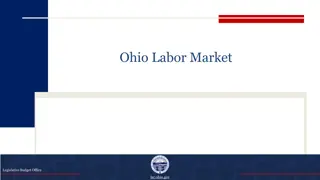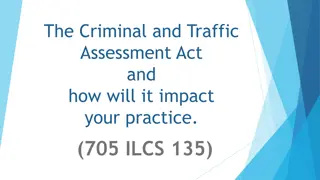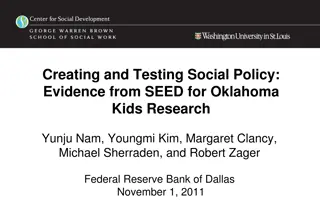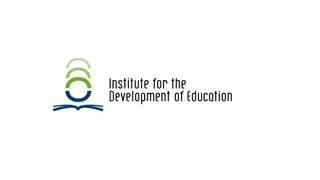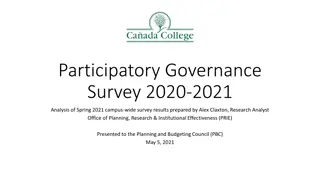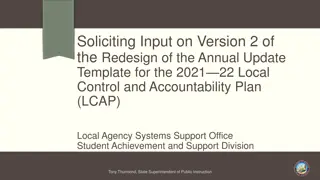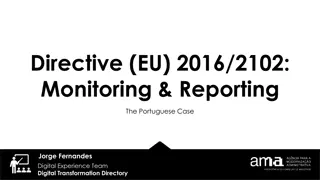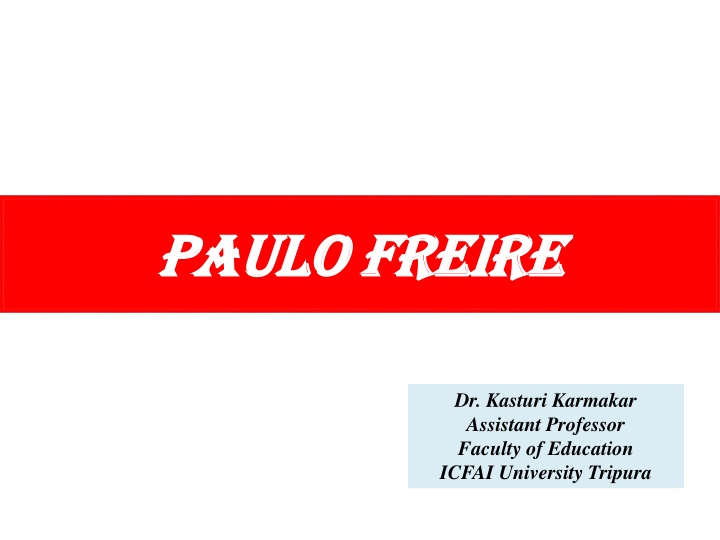
Critical Education Practices: Paulo Freire's Insights
Explore Paulo Freire's revolutionary perspectives on education, focusing on goals, dialogical methods, and criticisms of the traditional banking concept. Discover his contributions to authentic thinking and problem-solving in education.
Download Presentation

Please find below an Image/Link to download the presentation.
The content on the website is provided AS IS for your information and personal use only. It may not be sold, licensed, or shared on other websites without obtaining consent from the author. If you encounter any issues during the download, it is possible that the publisher has removed the file from their server.
You are allowed to download the files provided on this website for personal or commercial use, subject to the condition that they are used lawfully. All files are the property of their respective owners.
The content on the website is provided AS IS for your information and personal use only. It may not be sold, licensed, or shared on other websites without obtaining consent from the author.
E N D
Presentation Transcript
Paulo Paulo Freire Freire Dr. Kasturi Karmakar Assistant Professor Faculty of Education ICFAI University Tripura
Goals of Education Power Awareness Critical Literacy Desocialisation Self-Education
Dialogical Method Active, dialogical , critical and criticism Stimulating method Change in the programme and content of education. Use of techniques breakdown and codification . like thematic
Banking Concept of Education Teacher turns students into containers , into receptacles to be filled . Education thus becomes an act of depositing, in which the students are the depositories and the teacher is the depositor. Instead of communicating, the teacher issue communiqu s and makes deposits which the students patiently receive, memorise and repeat.
Characteristics of Banking Education The teacher teaches and the students are taught. The teacher knows everything and the students know nothing. The teacher thinks and the students are thought about. The teacher talks and the students listen meekly.
Characteristics of Banking Education The teacher disciplines and the students are disciplined. The teacher chooses and he enforces his choice, and the students comply. The teacher acts and the students have the illusion of acting through the action of the teacher. The teacher chooses the program content and the students (who are not consulted) adopt it.
Characteristics of Banking Education The teacher confuses the authority of knowledge with his authority which he sits in opposition to the freedom of the students. The teacher is the subject of the learning process, while the pupils are mere objects. own professional
Contributions of Freire to Principles and Practices in Education Authentic thinking- concerned with reality does not take place in ivory tower isolation, but only in effective communication. Problem-solving education, responding to the essence of consciousness- rejects communiqu s. epitomizes the special characteristics of consciousness. thinking that is intentionally Problem-solving
Contributions of Freire to Principles and Practices in Education The movement of enquiry must be directed towards humanization. The pursuit of humanity cannot unfold in the antagonistic relation between oppressors and oppressed. Teachers cannot think without the pupils, nor for the pupils but only with the pupils. In the banking system of education there should be a two-way traffic. The roles of the depositors, the prescribers and the receivers must be exchanged to a great measure.
Contributions of Freire to Principles and Practices in Education There should be true communication between the teacher and the students. A teacher cannot think for his students. He also cannot impose his thought on them. In the dialogical relations, no one teaches another, nor is anyone self-taught. People teach each other.
Contributions of Freire to Principles and Practices in Education Dialogue cannot exist without humility. Faith is an apriori requirement for dialogue. Problem-solving in the dialogical system stimulates creativity and true reflection. In the dialogical relations, arguments based on authority are no longer valid. Authority is on the side of freedom, not against it.







